Dentures, also known as false teeth, are a type of dental prosthesis for people missing one, some, or all of their teeth. Fitting a denture to replace missing teeth usually helps patients with their eating and speech. It can also protect the remaining teeth, prevent the face from sagging and improve the patient’s self-confidence.
You might imagine a set of teeth in a glass of water on the bedside table, but there’s a lot more to them than that!
There are many different types of dentures, classed according to:
- How many teeth they are replacing (full or partial)
- Whether they are fixed in place or removable
- Whether they are supported by the gum or by implants inserted into the jaw bone
- The material they are made from
You’re also probably wondering, ‘how much are false teeth?’, ‘how much does a denture cost for one tooth?’ or a full mouth? If you’re worried about the cost of dentures, the good news is that they are one of the most affordable types of prosthetic device available. If you have dental insurance, there might be some cover for false teeth included in your policy.
In this article, you can read about the different ways to fit artificial teeth and the approximate denture costs in the US. We also cover some of the practicalities of wearing them so you can decide whether they are an option for you.
Types of dentures
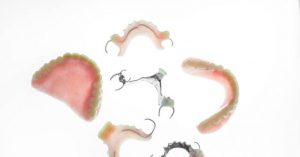

The term ‘dentures’ covers a whole range of false teeth options. It could be anything from one single replacement tooth hooked around neighboring teeth, to a full set of teeth on an acrylic base.
You’ll need to speak to your dentist to find out which type would be best suited to you, but below is some information on the main types of false teeth available so that you can understand your false teeth options and make an informed decision.
Complete vs. partial dentures
If you are missing all your teeth – whether due to injury, tooth decay or infection, periodontitis or a medical condition – you will need a complete set of replacement teeth.
The artificial teeth are fixed to a plate which sits snugly over your gums and – in the case of an upper denture – on the roof of your mouth. This plate is usually made from a gum-colored acrylic material, but the inner part can be made from metal. The ‘gum’ extends far enough away from the teeth that the edge is not visible when you smile.
When the base fits well, natural suction keeps it in place. But over time, your jaw bone changes shape and the plate will eventually become loose. False teeth glue can be used to keep it in place for a while, but if you’re experiencing this problem too often, it’s probably time to get a new set of teeth from your dentist.
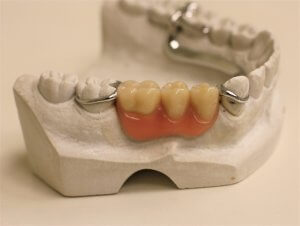

Partial dentures are used when some healthy, natural teeth are still present. They are carefully shaped by a dental technician to fit around and clip onto any remaining teeth. Both the artificial teeth and gum are colored to be a good match with your natural teeth and gums.
Although the metal clasps are designed to be as inconspicuous as possible, they may still be visible when you talk, depending on their position. The clips can be made from a tooth-colored material, but this isn’t as strong as metal. You can read our full guide to partial dentures if you want to know more. And you can read our article about dental flippers, a common type of partial dentures meant for temporary wear.
Removable false teeth
Traditional dentures are designed to be removable. Complete sets may have to be removed overnight for cleaning, whereas partial ones can often be worn for longer and brushed as normal. A dentist can advise on the exact cleaning procedure you should follow.
The fact that they are removable does mean they can slip out of place – particularly when eating foods that require a stronger biting force. For this reason, dentists often advise patients to avoid certain hard, sticky and chewy foods.
Patients may choose to use a dental adhesive which helps keep their artificial teeth more securely in place. This might allow access to more foods, but it can be messy and fiddly to deal with.
Implant-retained dentures
Dental implants are a permanent and versatile way to replace any number of missing teeth. A metal screw is inserted into the jawbone to provide the stability of a tooth root. An artificial crown, bridge or denture is then affixed to the implants.
Although implants are often used for single and multiple missing teeth, for now, we will focus on how a full set of permanent dentures can be supported by implants.
Fixed dentures are held securely in place by dental implants inserted into the jaw. This eliminates one of the big concerns many people have about conventional full dentures – that they will slip out of place, particularly on the lower jaw where there is not much for them to hold onto.
It’s possible to replace a full jaw of teeth with traditional teeth implants, but this technique typically requires 8-10 implants in the jaw. It is, therefore, the most expensive option.
With an implant-retained denture, just 4-6 implants are used in each jaw, making them a more affordable alternative to traditional implants. The overdenture is attached using either a metal bar which spans all the implants (as pictured) or individual ball attachments for each implant.
With some systems, the overdenture is fixed in place permanently while, with others, such as snap-in dentures, it is removed for cleaning as with regular false teeth.
It is possible to affix a removable overdenture with as few as two implants, but this won’t have the same biting and chewing strength as one that uses four or more implants. This technique is most often used with snap-in dentures.
Benefits of implants
Permanent dentures with implants are a good alternative to false teeth (as they are traditionally perceived), offering the following benefits:
- Teeth are stable and secure
- No discomfort from friction with the gum
- More hygienic due to less surface contact with gums
- Natural-looking
- Allow normal chewing and eating
- No acrylic blocking the taste of food
The implants gradually fuse with the jaw bone and encourage it to maintain its shape. Usually, when a tooth is extracted, the bone eventually recedes because it doesn’t have a root to hold on to, and over time, the face starts sagging. If bone loss has already occurred, the patient may have to undergo bone graft surgery before implants can be placed.
All-on-4 implants is a popular brand of full-mouth implant which allows the overdenture to be fitted on the same day the teeth are extracted.
Temporary false teeth
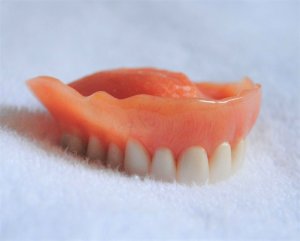

If you need to have an unhealthy tooth extracted, your dentist may wait a few weeks or months before measuring your mouth to create your false teeth. This allows the extraction site to heal and the gum to settle.
Patients who are missing a tooth in a prominent position may not want to walk around with a gappy smile for all this time. It’s, therefore, possible to get temporary false teeth that are fitted straight after extraction – known as ‘immediate dentures’. You can learn more about your denture options for these in our full guide to same-day dentures.
What are modern false teeth made from?
The teeth themselves can be made from acrylic resin, metal covered in acrylic, or porcelain. Acrylic is most commonly used these days because of its durability. Porcelain can look more natural but it’s more expensive and not as lightweight as acrylic.
When it comes to the base, a complete denture is usually acrylic, although it may be reinforced with metal. Partials more often use metal in the framework for added strength and durability — one of the better quality options is chrome dentures. The metal parts should be hidden on the roof of the mouth or behind the existing teeth, except for perhaps one or two metal clasps that fit around the existing teeth.
Flexible dentures
One popular alternative to conventional false teeth is flexible dentures such as Valplast flexible partials. These don’t have the rigidity of acrylic and are also less bulky. This means they are more comfortable to wear and are less likely to cause difficulties with speech.
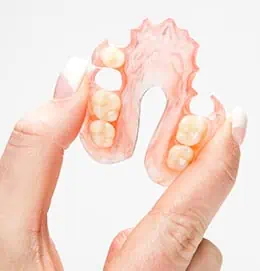

Benefits of Valplast flexible dentures include:
- Extremely durable material
- Soft material which is gentler to gums
- No unsightly metal clasps
- No adhesive needed
- Translucent resin material blends with natural gum color
- Thin and lightweight, less effect on speech
Valplast dentures are not a more affordable alternative to dentures, as they cost more than those that use traditional rigid materials. However, they are still a cheap alternative to implants and don’t involve any surgery.
Note that these can only be used for partial teeth replacement – they are not available as a full set.
False teeth costs in the US
How much are false teeth? And how much do good dentures cost? The cost of dentures in the US covers a large price range since there are so many variables involved.
Fake tooth costs can be as little as $300 for a full arch of “discount dentures”, but for these false tooth prices, you are likely to get the least comfortable and natural-looking option. The low-quality materials used in cheaper false teeth options means they probably won’t last as long as high-quality ones. Despite the lower fake tooth cost, you can end up paying just as much through more regular replacements. But how much does it cost for a full set of dentures that are good quality?


At the other end of the scale, premium dentures with a customized fit and more natural-looking materials can bring the cost of false teeth to thousands of dollars. These should come with a long warranty – or even a lifetime guarantee.
For a good quality but affordable custom-made set of dentures, you can expect to pay $800 – $1,500 for a full arch. These usually come with a warranty of around 2 years.
Partial denture costs are similar to those for a full arch, due to the amount of work involved with customizing them. A basic appliance can cost just a few hundred dollars while at the higher end of the scale you can pay several thousand.
Many dentists offer several denture options of differing quality at tiered false tooth prices. Discuss your false teeth options so you can get the right balance between cost of false teeth and quality.
Ways to save money and finance your dentures
If you can’t afford the cost of dentures, there are ways to pay less for dentures. We recommend seeking out financing options, including checking your Medicaid denture eligibility before choosing a more affordable alternative to dentures. That’s because anything more affordable will probably not be so beneficial to your oral health.
How much do fake teeth cost with insurance? Many of the best dental insurance plans cover dentures, but often with an annual limit of around $1,500. Check the details of your policy as some may offer a higher level of cover while others may not cover false teeth at all.
Another option is a dental discount plan. For a small monthly or annual fee, you receive a fixed discount on various dental treatments. If you know you need a lot of dental work, this can be a cost-effective option. Dental plans for seniors can be a good way to reduce the cost of dentures if you lose teeth later in life.
If you need help finding the right dental insurance plant for you, Dentalinsurance.com can help. They aim to make dental insurance easy to understand while offering the best plans in your state. They also offer helpful resources to help you choose the best plan for you. It’s easy to get started—just click on the link below and type in your zip code!
A dental insurance plan may cover part of your treatment costs. We know that dental insurance can be expensive and it can also be difficult to know which plan to choose.
But we are here for you — we’ve created a special comparison tool that shows you the top plans in your area to help guide you in your decision.
It takes just a few seconds to fill in your DOB and zip code, and you’ll see full coverage plans that cover your needs. Get started with the form below!


Also, see if your dentist offers a payment plan which allows you to spread the cost of false teeth over several months. You could also take out a personal dental loan, which may have better terms than a payment plan arranged through your dentist.
You might also look into traveling overseas for your new teeth. In places like Costa Rica and Mexico, you can save hundreds or thousands of dollars on dental treatment. Review all of these finance options in our guide here.
Comparison of tooth replacement options
The table below summarizes the points discussed so far for the different types of replacement teeth, and provides a summary of the question: ‘How much does it cost to get fake teeth?’
Type of denture | Traditional | Implant-supported | Flexible |
Material | Acrylic, nylon or metal, rigid shape | Titanium dental implant with overdenture | Nylon-based resin, soft and flexible |
Full or partial? | Either | Full | Partial only |
Longevity | Last around 5 years | Implants last 10+ years | At least as long as acrylic/metal lasts |
Cost | $300 – $8,000 depending on material and number of teeth | $6,000 – $30,000 for a full jaw depending on system used | $700 – $3,000 |
Practicalities | Gum changes shape over time, may become loose and uncomfortable; limited eating | Secure but removable; more comfortable to wear; normal eating | Can damage supporting teeth in the same way as acrylic/metal |
Our guide to missing tooth options has more about these and other possible ways to replace teeth.
Living with artificial teeth
The American College of Prosthodontists estimates that over 120 million Americans are missing at least one of their natural teeth, and more than 36 million have no natural teeth left. So, if you decide to get your missing tooth or teeth replaced, rest assured you won’t be alone. Fortunately, advances in dentistry mean it’s much harder than it used to be to spot whether someone’s teeth are natural or artificial.
Are they comfortable?
False teeth are custom-made to fit your mouth, so they should be comfortable to wear. That said, it might take some time to get used to them, particularly when eating.
However, as previously mentioned, your gums and jaw change shape over time, particularly after you have had teeth removed. Since the prosthesis is a fixed shape (unless you opt for a flexible material), it will become uncomfortable over time.
If you have any concerns you should visit your dentist. It’s better to get a new set made than to suffer in silence. If you wear a poorly-fitting appliance for long enough, you may start to develop mouth sores and even oral infections.
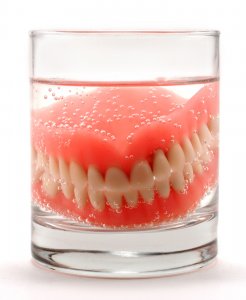

Cleaning and maintenance
Do you know why we have that stereotypical image of the teeth in a glass of water at nighttime? It’s not so much to clean them as to stop them drying out. Many people remove their false teeth overnight for comfort, and if not kept moist they can lose their shape.
You may simply place them in water or you can add a cleaning solution – but make sure you use one that’s compatible with your type of denture.
Your dentist may advise you to wear your teeth as much as possible or to remove them every night. Follow whatever directions they give you on this matter.
Regardless of how long you wear them for, your artificial teeth need to be cleaned every day. Again, your dentist will show you how to do this properly and may provide a special brush or another tool. You might not have to remove them every time you brush your teeth, but it’s easier to remove all traces of food if you can see what you’re doing.
If you don’t clean your dental appliance properly, not only are you increasing your chances of gum disease and tooth decay, but you’ll probably develop bad breath because of all the bacteria sticking to it. Cleaning also helps to reduce the chances of staining.
This video animation shows what your cleaning routine might look like:
If you’d like to learn more about how to take proper care of your dentures, we’ve got you covered in our denture care article here.
Meanwhile, you should maintain good oral hygiene practices to keep your remaining natural teeth clean. Brush twice a day with fluoride toothpaste and floss at least once a day.
How long do false teeth last?
There are three things that will mean you need to replace your appliance:
- Cracks and breakages to the materials
- General wear and tear (erosion, staining, etc.)
- Changes to the shape of your mouth causing a poor fit
Barring point 3, the materials used in traditional and fixed dentures can be expected to last up to five years – maybe longer if cared for well.
But your mouth may naturally change shape before this. It’s best to visit your dentist for new dentures before they become too loose or uncomfortable. It’s possible that you can get a denture reline instead of having to replace them completely. Also see your dentist if you notice clicking when you talk or eat, or if your gums are bleeding.
Broken denture repair near me
If you have implants and the overdenture becomes damaged, this damaged part can be replaced without interfering with the implants. In case you do need denture or appliance repair, dental labs can sometimes provide same-day service.
To find a denture repair lab near you, you can call 866-383-0748. It’s a fast and easy way to find a dentist who can repair dentures in your area.
Denture repair kit near me
If your denture only needs a reline and not replacement or repair for an actual break, you may be able to purchase a reline kit at your local pharmacy, or online from a shop like Amazon.
You can also read our article on how to make your dentures fit better for more information.
Alternative treatments
If you need to replace all or most of your natural teeth then your only choices are removable dentures or implants of some kind. Removable dentures cost a lot less than implants but aren’t as durable and may be less comfortable.
If you just have one or two missing teeth then you might consider a dental bridge. This type of prosthesis is like a permanent false tooth, but without the need for an implant. A bridge is held in place by the neighboring teeth, either with crowns or with bonded metal wings.
The downside of a bridge attached with dental caps (crowns) is that it requires a layer of the healthy adjacent teeth to be removed in order for the crowns to fit properly. If the patient ever wants to switch to a tooth implant, for example, the other teeth would need to be re-crowned individually.
Bridges are a natural-looking and long-lasting way to replace one – or even two – missing teeth. However, denture prices are likely to be more affordable than bridges.
Denture specialist near me
If you need help finding dentures near you you can begin by asking your general dentist for a referral. Alternatively, you can call 866-383-0748, where you’ll be connected to a denture clinic in your area.
Conclusion
False teeth may not be the ideal solution for everyone, and if worn long-term there is a risk of deterioration of the jaw bone. Still, lower denture costs mean they are an affordable way to fill a gap in your smile or replace all your teeth. Thanks to modern advances, denture options look more natural and feel more comfortable than ever before. If you’ve never had dentures, or are looking to get a new set, you can read our article on new dentures for more information.
It’s possible that you can get a denture reline instead of having to replace them completely, or you can try a DIY solution like the DenSureFit reline kit. To find out more about this popular product, you can read our DenSureFit reviews article.
Many people choose to get dentures as a temporary measure while they save up for permanent tooth implants. If you’re considering implants but are worried about the cost, check out our article on how to save money on cheap dental implants. We hope the information we provide helps you to find a solution you’re happy with.
3 Ways To Finance Dental Work That Aren’t Insurance
FAQs
Where can I find a denture repair lab near me?
If you need help finding a denture repair lab near you, you can call 866-383-0748. Dialing this number will put you in contact with a dentist in your area who can help you find the repairs you need.
What are the different types of dentures?
The different types of dentures include complete dentures, partial dentures, removable dentures and implant dentures. You can also get temporary dentures if you have a tooth extraction.
How much do dentures cost?
Dentures cost anywhere from $800 to $1,500 for a quality, custom-made set for a full arch. Implant supported dentures can cost anywhere from $6,000 to $30,000. If you need help paying for your dentures, you can ask your dentist if they offer payment or discount plans that can make them more affordable.
How do I find denture places near me?
If you’re looking for a denture specialist near you, you can begin by asking your regular dentist if they have any recommendations. You can also dial 866-383-0748 to get connected.




